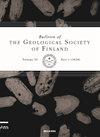The Salittu Formation in southwestern Finland, part II: Picritic-basaltic volcanism in mature arc environment
IF 1.3
4区 地球科学
Q2 GEOLOGY
引用次数: 1
Abstract
The Salittu Formation is one of the few metavolcanic successions in the Svecofennian orogen that contain ultramafic rocks. New samples were collected from the picritic and basaltic rocks as well as spatially associated gabbroic rocks, and their major and trace element compositions are presented and discussed here. Although the metavolcanic rocks have experienced primary alteration and two metamorphic events, elements that are insensitive to alteration (rare earth elements, Zr, Nb, Ni) have been used to infer their source and evolution. Based on the similar shapes of the rare earth element patterns in the metabasalt and metapicrite, basaltic melt derived from picritic one by fractional crystallization. The high Ni and Mg contents, Ni/MgO and Zr/Nb ratios, and multielement patterns make a slightly enriched garnet lherzolite a likely source for the metapicrite. With the exception of synvolcanic gabbros within the metavolcanic rocks, the gabbroic intrusions at Salittu have no genetic link to the metavolcanic rocks. Geochemical comparison with modern basalts suggests that the picritic and basaltic melts were generated in a mature arc environment during a rifting event. Picritic melt rose from convective mantle to the crust and formed a magma chamber. Basaltic melt fractionated in the chamber and extruded upon an earlier formed volcanic pile as basalt and synvolcanic gabbro. Soon after extrusion of the basalt, picritic melts, similar in composition to the earlier picrite, rose through the crust and extruded on top of the basalt. Comparison with three other metapicrite occurrences in southern Finland suggests that although the occurrences may be considered broadly comagmatic, each had their specific sources and probably also tectonic environments during emplacement.芬兰西南部Salittu组,第二部分:成熟弧环境下的picric -玄武岩火山作用
萨里图组是西芬系造山带中为数不多的含超基性岩的变质火山序列之一。从该区的苦橄岩、玄武岩以及空间伴生的辉长岩中采集了新的样品,并对其主量元素和微量元素组成进行了介绍和讨论。变质火山岩虽然经历了一次蚀变和两次变质事件,但对蚀变不敏感的元素(稀土元素、Zr、Nb、Ni)被用来推测其来源和演化。根据变质玄武岩和偏长石中稀土元素图案的相似形态,玄武岩熔体由榴辉石熔体分离结晶而成。较高的Ni和Mg含量、Ni/MgO和Zr/Nb比值以及多元素模式使略富集的石榴石辉橄榄岩可能成为偏黄铁矿的来源。除变质火山岩中有同火辉长岩外,萨利图的辉长岩侵入物与变质火山岩没有成因联系。与现代玄武岩的地球化学对比表明,该区苦荞质和玄武岩熔体形成于裂谷事件中成熟的弧环境。冰质熔融体从对流地幔上升到地壳,形成岩浆房。玄武岩熔体在岩室中分馏,挤压在早期形成的火山堆上,形成玄武岩和同火山辉长岩。玄武岩挤压后不久,与早期苦橄岩成分相似的苦橄熔体穿过地壳,挤压到玄武岩的顶部。与芬兰南部其他三个变长岩的比较表明,尽管这些变长岩可能被广泛认为是岩浆形成的,但每个变长岩都有其特定的来源,并且可能在侵位时也有构造环境。
本文章由计算机程序翻译,如有差异,请以英文原文为准。
求助全文
约1分钟内获得全文
求助全文
来源期刊
CiteScore
1.30
自引率
0.00%
发文量
5
审稿时长
>12 weeks
期刊介绍:
Bulletin of the Geological Society of Finland (BGSF) publishes research articles and short communications in all branches of geosciences. Contributions from outside Finland are welcome, provided that they contain material relevant to Finnish geology or are of general interest.

 求助内容:
求助内容: 应助结果提醒方式:
应助结果提醒方式:


